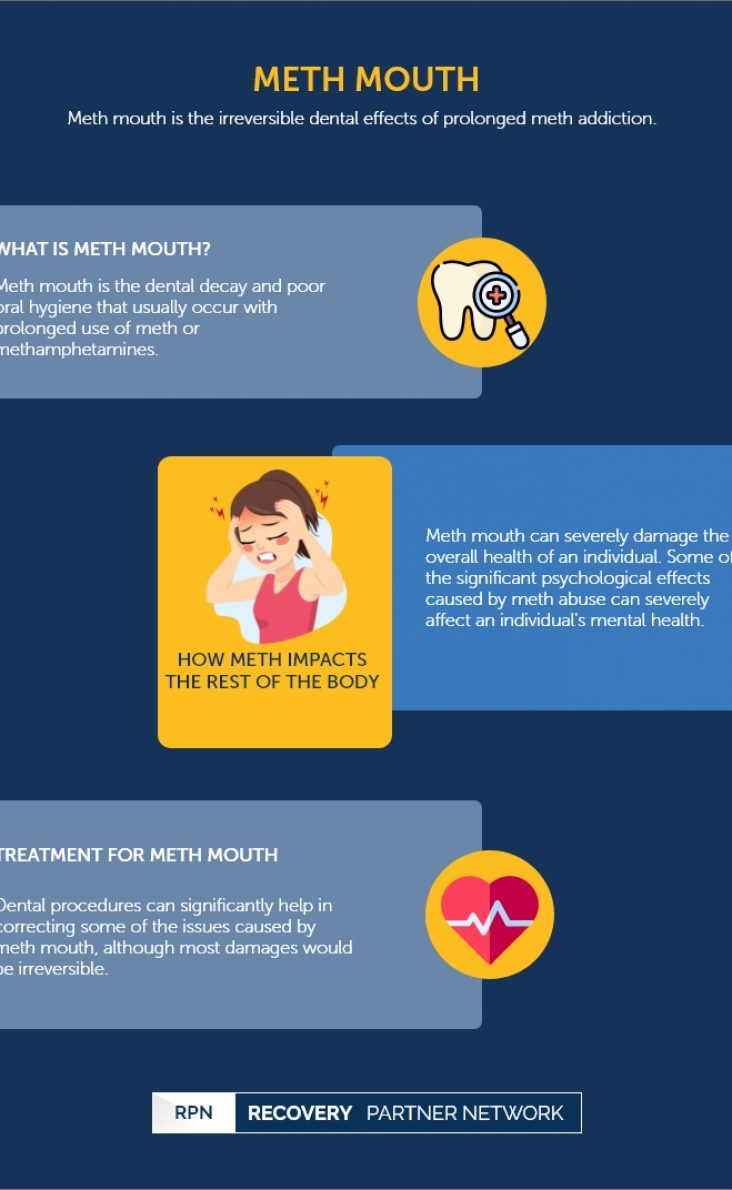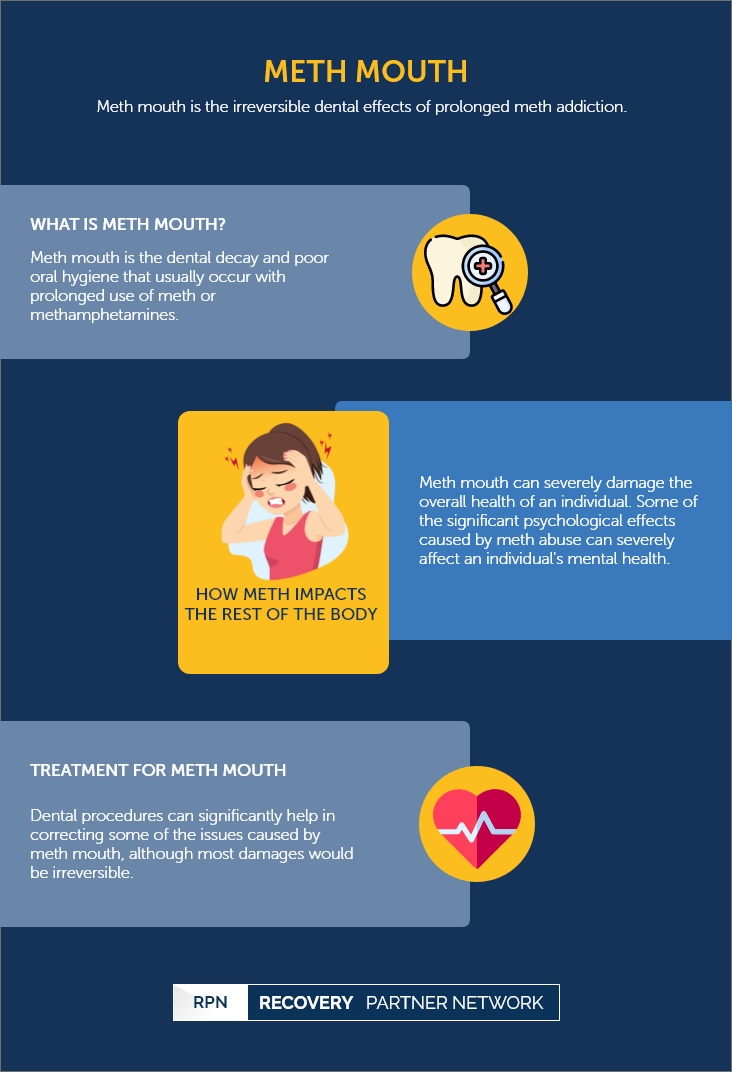Meth mouth is the irreversible dental effects of prolonged meth addiction.
Meth Mouth
Illicit drugs
- Ayahuasca addiction – Abuse
- Baclofen addiction
- Black tar heroin addiction
- Cannabis addiction
- Cocaine dependence
- Crack cocaine addiction
- DMT addiction abuse treatment
- Does Marijuana Kill Brain Cells?
- Ecstasy addiction
- Gabapentin addiction
- gamma-Hydroxybutyric acid addiction
- Hallucinogen
- Heroin addiction
- Illicit drug addiction
- Inhalant addiction
- Cocaine
- Ketamine addiction
- Lysergic acid diethylamide addiction
- Mescaline addiction
- Methamphetamine addiction
- Meth Labs: Cooking up Addiction
- Meth Mouth
- Microdosing
- Phencyclidine addiction
- Psilocybin mushroom addiction
- Sage of the diviners – Addiction
- Shooting Heroin
- Shooting Methamphetamine
- Smoking Cannabis
- Speedball
- Synthetic cannabinoids
Meth Mouth | Table of Contents
What is Meth Mouth?
Meth mouth is the dental decay and poor oral hygiene that usually occur with prolonged use of meth or methamphetamines. Meth mouth, which has been dubbed as “a dentist’s worst nightmare,” occurs as a combined result of acidic tooth decay and drug-induced physical changes. Meth mouth is one of the most distinctive physical changes that occur as a result of meth abuse, along with changes in facial features and skin damage from shooting meth.
According to the Journal of the American Dental Association (JADA), meth mouth is defined by gum disease and extreme tooth decay, which often causes teeth to chip away and fall out. The teeth of chronic meth addicts are often stained, blackened, rotting, crumbling, and falling off. Severe tooth decay in these addicts is likely due to a combination of drug-induced psychological and physiological damage that arise from dry mouth and lengthy periods of poor oral hygiene.
Some of the signs of meth mouth are:
- Cracked teeth, loose teeth, or missing teeth
- Gum disease, gingivitis, and periodontitis
- Xerostomia (dry mouth)
- Lockjaw
- Carious lesions (micro-cavities)
- Bruxism (teeth grinding or clenching)
- Black, rotting teeth
- Bad breath
FAQ
Methamphetamine use often results in a condition called “meth mouth,” signified by severe gum disease and tooth decay-causing teeth to break or fall out. Meth mouth leads to rotting, staining, blackening, and falling apart of teeth.
What Leads to Meth Mouth?
The main factors for developing meth mouth among meth addicts are poor dental health, lack of regular dental maintenance, and lack of good nutrition. Poor dental hygiene can occur from forgetting to brush teeth or consuming high amounts of sugary food and drinks, which is a common habit among addicts. Combining sugary food with meth contributes to enamel damage and cavities, if left untreated, can result in nerve damage, tooth damage, and abscesses in the mouth. The lack of nutrition can further contribute to the body’s inability to heal. As a consequence, individuals with meth mouth may endure extreme pain due to lesions or abscesses that do not completely heal.
The acidic components of meth disintegrate and weaken the teeth, making them easier to break, chip, and eventually fall out. The chemicals found within meth, such as battery acid, drain cleaner, antifreeze, and lantern fluid, cause the teeth to erode as they are too harsh for human consumption. Habits such as grinding teeth and clenching jaws commonly seen among meth addicts further exasperate these conditions.
Meth consumption reduces the production of saliva, an important element of maintaining oral hygiene. The lack of salvia production over days contributes to dry mouth, also known as Xerostomia. This creates an ideal condition for bacterial growth that causes tooth and gum decay.
A report published by the Journal of Periodontology also concludes that the method of meth use can also contribute towards the severity of meth mouth. It suggests that those who snort meth experience severe tooth decay compared to those who smoke or inject the drug.
How Meth Impacts the Rest of the Body
Meth mouth can severely damage the overall health of an individual. In addition to open wounds in the mouth and blood-born infections from bacteria, meth abuse can also cause:
- Premature delivery
- Hyperthermia
- Convulsions
- Heart problems
- The risk for HIV and hepatitis
- Lead poisoning
- Stroke
- Brain damage
- Meth mite itching (itching caused by nerve sensitivity)
Some of the significant psychological effects caused by meth abuse, such as aggression and paranoia, can severely affect an individual’s mental health. Meth abuse also generates life-threatening health problems that should be treated immediately.
Meth Mouth Statistics
Researchers at the University of California, Los Angeles,, assessed the mouths and mental health of 571 meth users in 2015. The results showed that,
- Meth users often encountered dental problems or periodontal disease
- 31 percent had six or more teeth missing
- 96 percent had cavities
- 58 percent showed signs of untreated tooth decay
The report further suggested that female meth users had higher rates of tooth loss and cavities than male users. The incidence of tooth decay in the front teeth was also higher among female meth users.
Treatment for Meth Mouth
Meth mouth is only one of the many side-effects of meth abuse. In most cases, teeth damaged during meth use have to be removed completely. Dental procedures can significantly help in correcting some of the issues caused by meth mouth, although most damages would be irreversible.
However, unless an individual addresses their drug addiction, no amount of dental treatment can help fix the plight of meth mouth. The initial stage of all addiction treatment consists of detoxification. Detox helps patients remove the addictive substance from the body. Due to the severity of meth withdrawal symptoms, patients are highly advised to seek assistance from a professional treatment center when trying to quit. Theses treatment centers provide around-the-clock medical care, along with detox, therapy, and counseling, to help patients address the physical and psychological dependence on the drug.
After the completion of inpatient or outpatient rehabilitation, most individuals recovering from meth addiction must continue their treatment through aftercare programs or ongoing treatment programs. These programs provide further counseling and introduction to support groups such as Crystal Meth Anonymous (CMA). These support groups are a vital part of prolonged recovery as they provide a sense of community among their peers who hold each other responsible for their actions. Although the effects of meth mouth can not be completely fixed, it is crucial to see a dentist at the earliest convenience.
Recovery Partner Network
We aim to educate and empower. If you feel our library of resources does not cover your specific need, reach out to us, and we would be happy to help.
STATISTICS
© Copyright 2026


